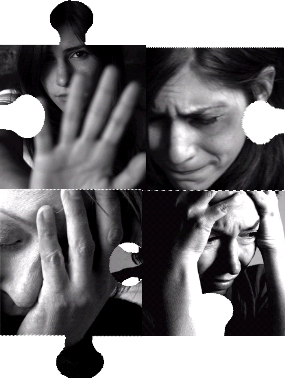How can we break the vicious circle of domestic violence? "Some would say, "Let the violent woman leave her abuser! This leap into the void is not so easy to make. And it's hard to do on your own, which is why it's so important to be able to count on resources.
Why doesn't a woman in the grip of a violent man leave him? For a number of reasons. Firstly, by the time she realizes the impasse, the woman is often exhausted, both physically and psychologically. She's ashamed to admit that she wasn't up to the job, and feels responsible for the couple's failure and the family's breakdown. Violence wears you down.
Then, as we often forget, her tormentor is also a man she has loved or feels she still loves, a man she wants to remember in love. Between them, there were probably years of happiness. There was the hope of a lasting relationship. Between them, perhaps, there are children.
Poverty is a constant threat to women. Among Canadian women living in poverty, single mothers are particularly vulnerable: 51.6% of single-parent families headed by women are poor (Source: Canadian Research Institute for the Advancement of Women). In our services, these statistics are even higher: 72.2% of women have an annual income of less than $10,000. When women leave the shelters where they have found refuge, almost 50% of them have to turn to social assistance.
Poverty, economic instability and income insecurity have a direct impact on quality of life, safety, well-being and access to basic human needs such as food, shelter and health care, as well as on the ability to care for dependents. (Canadian Women's Foundation)
These women are well aware that they will no longer be able to offer their children the same level of comfort. In addition to the fear of having to live on a shoestring, they feel a sense of shame at the idea of having to live with a poverty label.
To prevent a woman from leaving a violent partner, there are promises, but also threats. He threatens to hit her, if she hasn't already been hit, or to hit her harder. He talks of breaking a limb. He threatens to commit suicide, or sometimes even to kill her and the children. The moment the woman decides to break up with him, the threats intensify, the violence intensifies and the blackmail becomes more persistent.
The woman trapped in the cycle of domestic violence experiences a profound sense of powerlessness. She needs a helping hand to overcome the effects of this situation, and to regain her self-esteem and confidence in her own perception of reality. She'll need someone to listen to her and believe her. She'll need to put her own safety first in the search for solutions. She'll also need those around her to help her satisfy her need for security, neighbors, family and friends to support and protect her. This primary network is part of a set of community and institutional resources that can help her regain control over her life.
* From La Gigogne
Understanding what is going on is the first step.
Take that first step. Talk to someone about it. Break the silence.
Call us at 1-800-461-1842. We can help you. You can also text us : 613-801-8169 or chat with us at www.unsafeathomepr.ca
